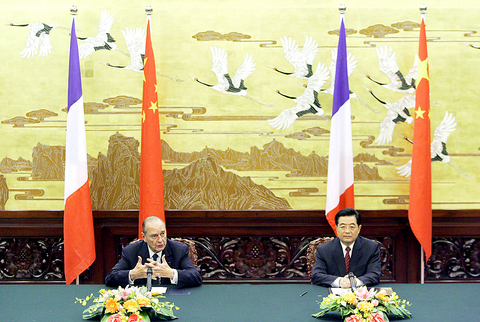Airbus yesterday won a Chinese order of 150 A320 aircraft and agreed to set up a plant in China in a deal seen as giving the European giant a launchpad into the world's most lucrative aviation market.
The multi-billion-dollar arrangement, one of 13 deals signed during a visit by French President Jacques Chirac to Beijing, was accompanied by an option for China to buy 20 of Airbus' new wide-body A350 planes.
The Airbus A320 assembly plant, to be located in Tianjin not far from Beijing, will complete its first aircraft in 2009 and will subsequently manufacture four a month, the aircraft maker said.

PHOTO: AP
"It's a means for us to develop a long-term vision with the Chinese," Louis Gallois, the chief executive of the European aerospace giant, told reporters.
"It's clear that building the planes in China will give the Chinese an incentive to buy more of our aircraft," he said.
No figures were immediately available about the value of the 150-plane deal although estimates based on the list price of the aircraft were as high as US$10 billion.
It follows China's order last year of another 150 Airbus planes, also with a list price of nearly US$10 billion, which was signed when Chinese Premier Wen Jiabao (
Airbus has previously published estimates that potential sales among all airlines in China over the next 20 years will total around 1,600 planes.
The European company is seeking to undercut US rival Boeing which has about two-thirds of the lucrative Chinese civil aviation sector and says it is aiming for a 50 percent market share.
Analysts said yesterday's developments could be significant in helping Airbus achieve its goal.
Ian Thomas, a consultant at the Center for Asia Pacific Aviation in Australia, said the Airbus deal "reflects the increasing growth and focus of the China domestic market.
"It also reflects the development of more short-haul services within that market. The A320 is specifically geared towards that area," he said.
The A320, a medium-range, single-aisle twin-engine jet capable of carrying up to about 180 passengers, remains the European company's most popular aircraft after 17 years on the market.
It is in direct competition with Boeing's 737 model and targets the same fast-growing segment of Chinese aviation.
In June, China's National Development and Reform Commission, the national planning agency, approved the plans for a plant in Tianjin, calling the move an important step for the nation's aviation industry.
China has repeatedly stated its ambition of building large passenger jets by 2020 although it is still struggling to develop a market for domestically built jets of 70 to 90 seats.
Airbus will hold a 51 percent stake in the Tianjin facility, according to sources close to the negotiations between Airbus and China.

SECURITY: As China is ‘reshaping’ Hong Kong’s population, Taiwan must raise the eligibility threshold for applications from Hong Kongers, Chiu Chui-cheng said When Hong Kong and Macau citizens apply for residency in Taiwan, it would be under a new category that includes a “national security observation period,” Mainland Affairs Council (MAC) Minister Chiu Chui-cheng (邱垂正) said yesterday. President William Lai (賴清德) on March 13 announced 17 strategies to counter China’s aggression toward Taiwan, including incorporating national security considerations into the review process for residency applications from Hong Kong and Macau citizens. The situation in Hong Kong is constantly changing, Chiu said to media yesterday on the sidelines of the Taipei Technology Run hosted by the Taipei Neihu Technology Park Development Association. With

CARROT AND STICK: While unrelenting in its military threats, China attracted nearly 40,000 Taiwanese to over 400 business events last year Nearly 40,000 Taiwanese last year joined industry events in China, such as conferences and trade fairs, supported by the Chinese government, a study showed yesterday, as Beijing ramps up a charm offensive toward Taipei alongside military pressure. China has long taken a carrot-and-stick approach to Taiwan, threatening it with the prospect of military action while reaching out to those it believes are amenable to Beijing’s point of view. Taiwanese security officials are wary of what they see as Beijing’s influence campaigns to sway public opinion after Taipei and Beijing gradually resumed travel links halted by the COVID-19 pandemic, but the scale of

A US Marine Corps regiment equipped with Naval Strike Missiles (NSM) is set to participate in the upcoming Balikatan 25 exercise in the Luzon Strait, marking the system’s first-ever deployment in the Philippines. US and Philippine officials have separately confirmed that the Navy Marine Expeditionary Ship Interdiction System (NMESIS) — the mobile launch platform for the Naval Strike Missile — would take part in the joint exercise. The missiles are being deployed to “a strategic first island chain chokepoint” in the waters between Taiwan proper and the Philippines, US-based Naval News reported. “The Luzon Strait and Bashi Channel represent a critical access

Pope Francis is be laid to rest on Saturday after lying in state for three days in St Peter’s Basilica, where the faithful are expected to flock to pay their respects to history’s first Latin American pontiff. The cardinals met yesterday in the Vatican’s synod hall to chart the next steps before a conclave begins to choose Francis’ successor, as condolences poured in from around the world. According to current norms, the conclave must begin between May 5 and 10. The cardinals set the funeral for Saturday at 10am in St Peter’s Square, to be celebrated by the dean of the College